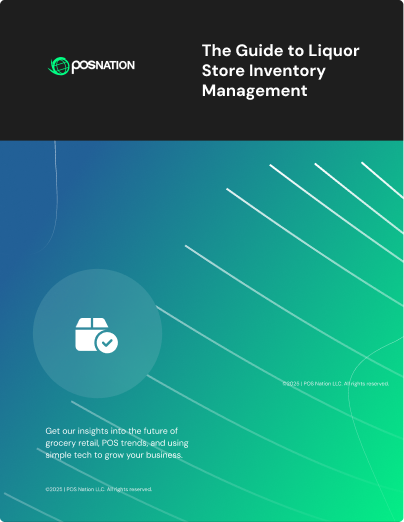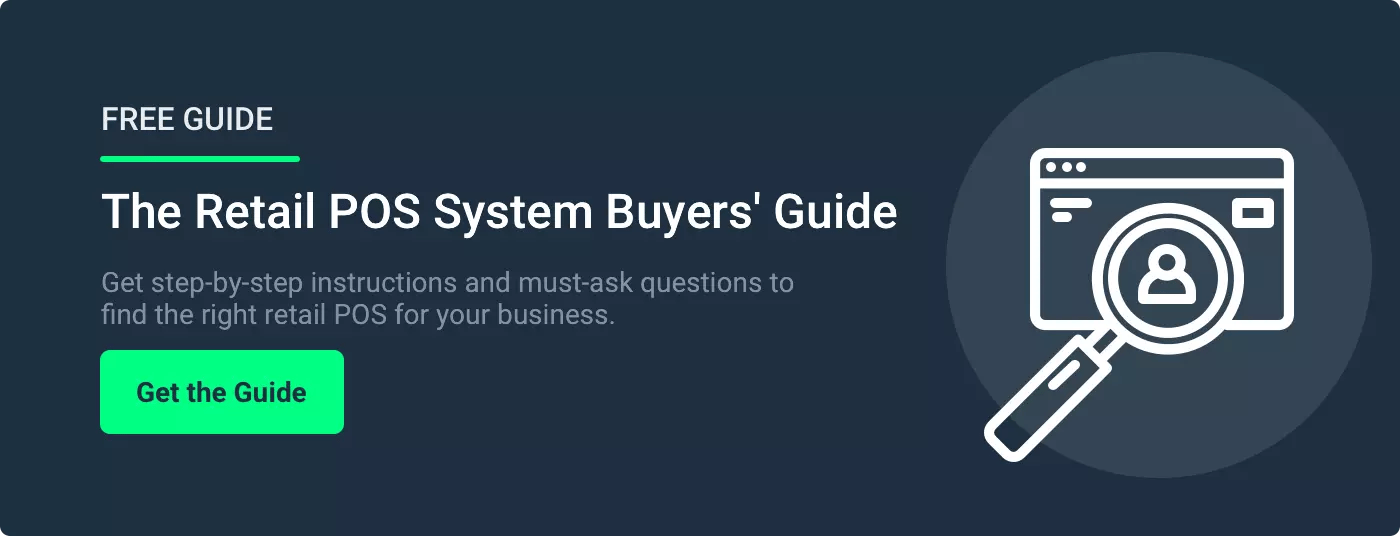As a grocery store owner, it might not shock you to know that grocery stores in the US waste 80 billion pounds of food every year due to spoilage, theft, and administrative errors.
Unfortunately, It’s easy to run into shrinkage-related challenges like these — especially if you’re tracking inventory using manual processes or spreadsheets. But there’s another way!
By investing in inventory management software, grocery store owners can minimize errors and shrinkage, improve sales performance, and boost profits. But what features are most important? Which features don’t you need?
In this article, we’ll explore the features your grocery store needs to succeed and how to choose the right software to manage your inventory like a pro.
The Inventory Management Software Features You Need
For grocery stores, inventory management is a potential minefield. You sell a wide variety of items, manage a swift rotation of perishable goods, and need just the right amount of inventory to meet customer demand. You also can’t overstock to the point of wastage.
Now imagine doing this manually. Some store owners are! It’s time-consuming and error-prone, and if items go unsold and past their sell-by date, you could incur losses. Not to mention unhappy customers.
Related Read: Automated Inventory Management: Why It's a Critical Feature for Retailers [EXAMPLES]
Then there’s training staff. Manual inventory management requires detailed knowledge of the products, an understanding of the store layout, and accurate recording and monitoring of stock levels. With high turnover rates common in the retail sector, keeping everyone up to speed can be quite a challenge.
Enter inventory management software — specifically, a point of sale (POS) system. With a POS system with built-in inventory management features, you can track sales in real time, automate reordering processes, and generate comprehensive reports that make managing your store a breeze.
You can also ensure accurate stock counts, manage product turnover, and even identify sales trends. Not only does this make inventory management more efficient, but it also provides valuable insights that can help drive business growth.
But what features should your POS system have?
1. Real-Time Inventory Tracking
How often has a customer asked if there’s a product in stock and you’re unsure? Or how often do you run out of popular seasonal items when they’re in high demand? Enter real-time inventory tracking. With it, you can keep an eye on your stock at all times.
Why is this helpful?
- Every time you make a sale, your POS system sends this information to your inventory software, which triggers an update of your inventory levels.
- When you receive new stock from suppliers, your employees can scan each product into the system and update your inventory in real time.
- Real-time inventory tracking software comes with monitoring and alerts. You'll get an alert if a product drops below a certain threshold. Some POS systems let you set automatic reordering points, meaning you don’t have to order the product manually.
- Modern inventory tracking systems are cloud-based, so you can access your inventory data from anywhere, at any time.
- Additionally, real-time inventory tracking often includes comprehensive reporting features. Insights into sales trends, popular products, and seasonal demand allow you to stock what's in demand.
Related Read: 5 Amazing Grocery Store POS Systems [Pricing and Reviews]
Real-time inventory tracking is a powerful software feature that ensures you always have a clear, accurate picture of your stock.
2. Automated Billing
This feature is a time-saver and can streamline your checkout process. Your cashier uses a barcode scanner to read each product’s information, and your POS system tallies up the cost of each item as it is scanned, adding it to the total bill. No more errors and a faster process!
Modern systems can also:
- Recognize items on sale or applicable discounts based on membership cards or promotional codes, and automatically deduct these from the total.
- Automatically apply the correct tax rate for each item, ensuring the total bill is tax compliant.
- Your inventory management software receives information about the items sold from the POS system every time a sale is made. The inventory levels are then updated accordingly, keeping them accurate and current. No more manual stocktakes at the end of the day!
In addition to making checkout faster and more efficient, automated billing integrates seamlessly with inventory management.
3. Integrated Receiving and Order Management
Being aware of the stock you have on hand is essential, especially for grocery stores. Creating a system to coordinate incoming deliveries and order management processes is a great place to start if you want a more streamlined way to manage your supply chain.
With integrated receiving, the moment your stock arrives, the inventory management system is updated automatically. There’s no lag between receiving and recording your stock. Likewise, when a customer places an order, your system immediately adjusts the inventory levels. You’ll always have an accurate understanding of what’s in stock and what’s been sold.
With this system in place, you reduce the need for double entry and minimize errors. You’ll have real-time visibility, and you can ensure your customers’ favorite products are in stock. Finally, you’ll have valuable insights into sales trends, customer preferences, and supply chain efficiencies, helping to inform data-driven decisions.
4. Shrinkage Reports
Shrinkage happens. Whether through employee fraud, shoplifting, vendor fraud, damaged goods, or administrative errors, shrinkage reports are vital to finding the culprit. They help you understand where and why losses occur.
By identifying the source of inventory shrinkage, you can take action to mitigate losses. For example, if you see that theft often occurs at your self-checkout stations, you can install surveillance cameras and train your employees to look for tell-tale signs of theft.
Reducing shrinkage impacts your bottom line and helps you understand loopholes in your operations. However, preparing these reports might be time-consuming, so it’s best to partner with a POS provider that makes reporting easy and accurate.
5. Demand Forecasting and Analytics
Wouldn’t it be great if you had a crystal ball that could predict customer demand? Well, you might not have an actual crystal ball, but with demand forecasting and analytics, you can use historical sales data, market trends, and other relevant information to do the same job!
Related Read: GUIDE: How To Use Your Point of Sale Analytics To Increase Profits
With forecasting and analytics, you can:
- Manage inventory more efficiently. No more over or understocking, especially of perishable items, which leads to waste and lost sales. With no inventory buildup, you can reduce storage costs and improve cash flow.
- Better anticipate customers' needs. Ensuring popular items are in stock improves customer satisfaction and drives loyalty and repeat business.
- Optimize your supply chain. When you know what, how much, and when you’ll need it, you can improve relationships with suppliers, and even negotiate better terms and conditions with suppliers.
- Plan your business strategy. With valuable insights into trends and customer behavior, you can plan marketing campaigns, promotions, and even your store layout.
In a nutshell, demand forecasting and analytics provide the foresight needed to run a successful grocery store.
6. Purchase Order Management
Knowing and keeping track of the orders you place, their arrival schedule, and associated costs is vital to supply chain operations. A well-organized purchase order management system provides complete transparency into the procurement process and gives you control over your operations and finances.
With better coordination with suppliers, you can maintain optimum inventory levels, get more favorable terms, and cooperate better if anything changes. Purchase orders act as a legal agreement, so you’re covered in case there are any disputes.
Managing purchase orders can be challenging. If you have a large number of SKUs, you’ll need to keep accurate records. Errors can lead to incorrect orders and missed deliveries. You’ll also depend on suppliers to deliver as expected. Modern POS systems offer integrated purchase order management features to help manage these errors.
Choosing the Right Software
Inventory management software is vital to your grocery store’s success. But not all retail POS software is built the same. For example, you need software that’s flexible and scalable. As your business grows, your inventory management system should grow with you and be able to handle the increased workload.
Flexibility allows you to adjust the system according to your specific needs. Whether you need to add a new product category or integrate with another software, a flexible system can accommodate these changes.
What software should it integrate with? Whatever you need to run your unique store successfully. From barcode scanners to deli and scanner scales and e-commerce platforms, does your inventory software play nice?
Last, consider the specific features you might need. Prebuilt reports or report templates, including sales, inventory, and shrinkage reports, can be game-changers. Likewise, look for a solution with an unlimited database. You want to be able to add as many products, suppliers, or customers as you need without worrying about hitting a limit.
Grocery Store Inventory Management Software Features: Get What You Need
A POS system with built-in inventory management software can take your grocery store to the next level. Modern systems streamline inventory management, making it easy to keep track of stock levels, manage orders, and generate useful reports.
Still, a robust POS system is only as good as the people operating it. Train your staff and choose a user-friendly system with an intuitive interface to see great results.
At POS Nation, we work with many grocery store owners and provide a flexible and scalable system, designed with the needs of grocery stores in mind. We offer robust inventory management features, along with other capabilities like sales tracking and customer management, making it an all-in-one solution for your business needs.
Want to see our POS system in action? Schedule a demo with our grocery experts today. You can also check out our Guide to Grocery Store Inventory Management for a deeper understanding of inventory management.







 by Gina Obert
by Gina Obert


